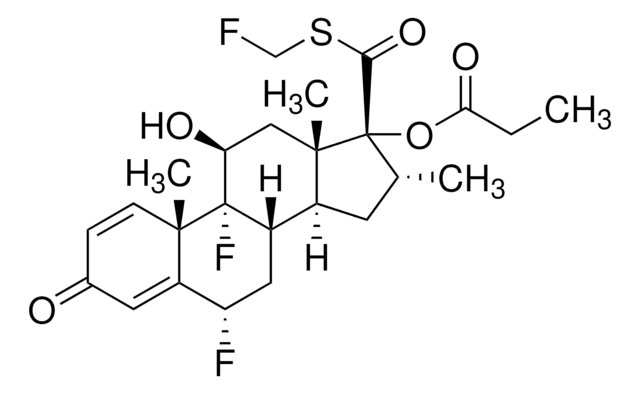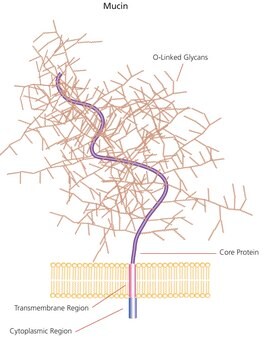1285873
USP
Fluticasone propionate
United States Pharmacopeia (USP) Reference Standard
Synonym(s):
(6α,11β,16α,17α)-6,9-Difluoro-11-hydroxy-16-methyl-3-oxo-17-(1-oxopropoxy)androsta-1,4-diene-17-carbothioic acid S-(fluoromethyl) ester
About This Item
Recommended Products
grade
pharmaceutical primary standard
API family
fluticasone
manufacturer/tradename
USP
application(s)
pharmaceutical (small molecule)
format
neat
SMILES string
CCC(=O)O[C@@]1([C@H](C)C[C@H]2[C@@H]3C[C@H](F)C4=CC(=O)C=C[C@]4(C)[C@@]3(F)[C@@H](O)C[C@]12C)C(=O)SCF
InChI
1S/C25H31F3O5S/c1-5-20(31)33-25(21(32)34-12-26)13(2)8-15-16-10-18(27)17-9-14(29)6-7-22(17,3)24(16,28)19(30)11-23(15,25)4/h6-7,9,13,15-16,18-19,30H,5,8,10-12H2,1-4H3/t13-,15+,16+,18+,19+,22+,23+,24+,25+/m1/s1
InChI key
WMWTYOKRWGGJOA-CENSZEJFSA-N
Gene Information
human ... NR3C1(2908)
Looking for similar products? Visit Product Comparison Guide
General description
Application
- Fluticasone Propionate and Salmeterol Inhalation Aerosol®
- Fluticasone Propionate and Salmeterol Inhalation Powder
- Fluticasone Propionate Cream
- Fluticasone Propionate Inhalation Aerosol®
- Fluticasone Propionate Inhalation Powder
- Fluticasone Propionate Lotion
Biochem/physiol Actions
Analysis Note
Other Notes
Legal Information
related product
Signal Word
Warning
Hazard Statements
Precautionary Statements
Hazard Classifications
Repr. 2 - STOT RE 2
Target Organs
Endocrine system
Storage Class Code
11 - Combustible Solids
WGK
WGK 3
Flash Point(F)
Not applicable
Flash Point(C)
Not applicable
Certificates of Analysis (COA)
Search for Certificates of Analysis (COA) by entering the products Lot/Batch Number. Lot and Batch Numbers can be found on a product’s label following the words ‘Lot’ or ‘Batch’.
Already Own This Product?
Find documentation for the products that you have recently purchased in the Document Library.
Customers Also Viewed
Our team of scientists has experience in all areas of research including Life Science, Material Science, Chemical Synthesis, Chromatography, Analytical and many others.
Contact Technical Service




